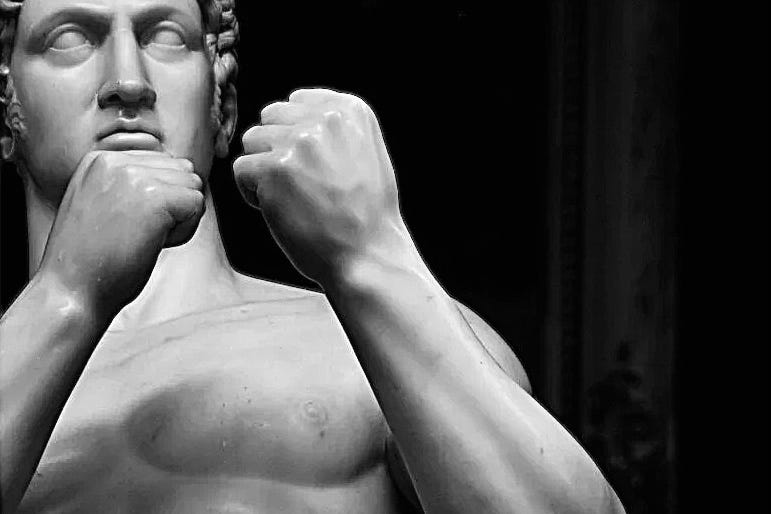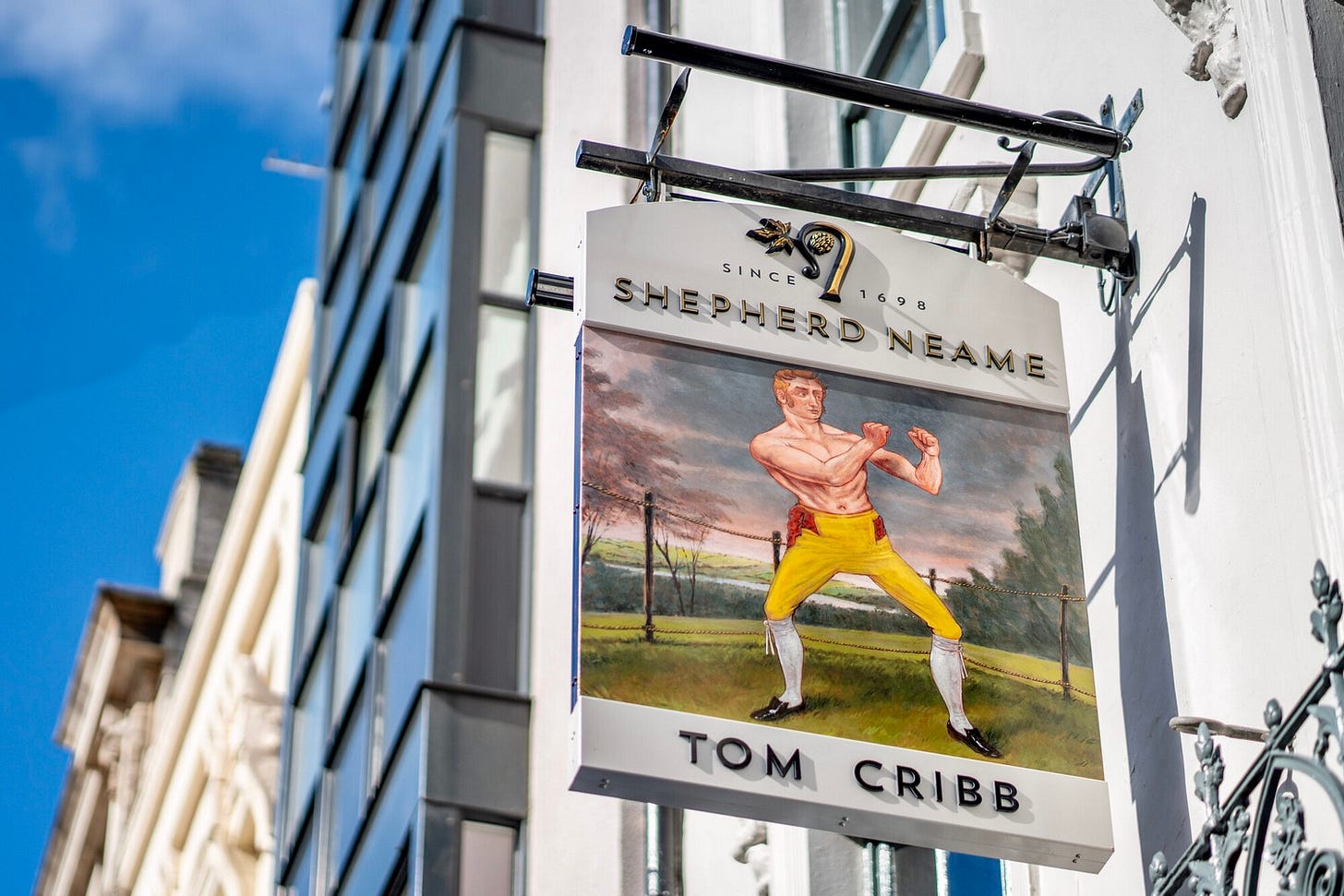In among the paintings by Turner, Reynolds and Constable stands a life-size marble statue of a bare-knuckle fighter titled Athleta Britannicus. The curators of the gallery at Petworth House believe sculptor John Rossi’s subject may be Tom Cribb, All England Champion at the height of the Napoleonic Wars, who retired to become a coal merchant and then pub landlord.
Their attribution goes on to state that “during the early 19th century, bare-knuckle fighting was a national obsession, viewed by political and cultural leaders as a rallying symbol for egalitarianism and patriotism.” A bold claim that probably suffers from a touch of hyperbole. What, though, might Rossi or the leaders of the time have made of today’s cross-code bouts, influencers scrapping, press conference trash talk, Netflix docuseries and hyper-hyped Saudi showdowns?
Cribb fought decades before the introduction of the Marquess of Queensbury Rules in 1867. While these have set the framework for boxing to this day, the ‘noble art’ moniker that often accompanies them - and which itself probably dates back to the early eighteenth century - has long since seemed ironic. While no nationwide obsession, boxing does however demonstrate the power of publicity in generating deep and lucrative, if narrowly-focused, public support. Other sports shouldn’t be sniffy about looking and learning, however tawdry they may sometimes find the experience.
One of the most illuminating events I’ve attended in sport leadership was a breakfast with Barry Hearn, at which the promoter explained how he had packaged and presented a range of sports to maximise their appeal. Even fishing. Frankly, it was genius.
Last week Tyson Fury performed to boxing press conference type in promoting his next fight. He was last in the ring - and briefly flat out on its canvas - winning a split decision against an MMA fighter who was a boxing novice. The bout was in Saudi Arabia, of course. Both times I thought immediately of lessons I learned from Hearn’s business craft, although Fury himself is co-promoted by Frank Warren and Bob Arum.
“I’m gonna bust him. Sausage! Ugly little man. Rabbit! Run rabbit, run rabbit, run run run. You know what’s coming. You’re getting smashed to pieces, sausage… You beat all the rest of them, but you ain’t beat Tyson Fury yet, sausage.” Fury to Oleksandr Usyk
Tickets sell for big fight nights because of personality, jeopardy and the raw ingredients of boxing itself. Often the hype obscures mismatches (reducing jeopardy on at least one dimension - the absolute outcome) and a lack of relevance (a function of too many governing bodies), and even at times a whiff of corruption (either inside or outside the ring). The boxers themselves are the essential cogs in this publicity machine.
Too many other sports have lost sight of the importance of engaging or arresting personalities, whether genuine or confected for the media. Sanitised athletes with carefully curated social media profiles might allow the owners of sporting properties to sleep easy at night, but ultimately they don’t sell tickets - or not in such numbers as those with an edge or an axe to grind.
Max Verstappen illustrated the point to perfection at last weekend’s Las Vegas Grand Prix. Compare his before and after comments about F1’s flamboyant, expensive jaunt to America’s gambling capital:
Before: “I feel like a show is important, but I lack emotion… I love Vegas but not to drive a F1 car… If I was a fan, I would tear the whole place down.”
After: “It was a lot of fun there… I hope everyone enjoyed it a bit, we definitely did, so already excited to come back next year.”
What a difference a victory makes, and no doubt a word in Verstappen’s ear after the sport had spent a reported $700 million of its own money to establish the race. But it’s the unleashed, pre-race Verstappen who has real commercial value for F1.
It doesn’t have to be trash talk, but in a crowded market our stars need to be metaphorically bare-knuckled and bare-souled. They might even end up with the pub they managed in retirement named after them.
And the winner is…
An unscientific straw poll of fans watching from afar showed a universal preference for an Indian win in Sunday’s ICC World Cup Final. One friend cited his ‘anyone but Australia’ rule. Cricket badly needed an Aussie victory though. This was a competition short on jeopardy and, home team matches apart, crowds. With money and power in the sport concentrated so heavily in India, cricket had to reassure us that cash isn’t necessarily king and is no guarantor of victory.
Sides batting first won exactly half of the 48 matches. They did so by an average of a whopping 120 runs. Those batting second and winning still had 58 balls to spare, so just under 10 overs on average - 20% of their allotted total.
At least the margins will naturally be far smaller in next year’s T20 World Cup in the West Indies and USA. Twice as many teams, 20, will compete in just over half the time, 26 days, as the 50 over competition just ended. Let the bare-knuckle hype begin.
Just don’t think about trying to book a trip to the WC yet though - the ICC hasn’t even announced the venue for the final, let alone a competition schedule. Out, hit wicket. Barry Hearn wouldn’t make that mistake in fan-engagement.
Shear heart attack
One of the joys of writing Sport inc. is reader feedback. A recent edition on the promotion of the Rugby World Cup and the approach of Paris 2024 elicited a lengthy email chain from a group who had attended many of the matches and were, days later, still debating the nuances of the sport’s rules and the tight, tournament-defining refereeing calls. Both an endorsement of rugby’s power to engage and a warning that it’s complexity might contain the seeds of its ultimate demise.
That edition also prompted a gentle rebuke for my comments about the French public’s willingness to embrace big events. One correspondent had attended the 2019 World Sheep-Shearing Championship in Le Dorat, 40km north of Limoges. 300 athletes from 32 countries, 5000 sheep and 62,000 spectators. If in doubt, check out the crowd at the end of this clip






Nice one Ed! It's a shame Fury is such a deeply, deeply unappealing person...
(And well done Australia!! :-) An excellent performance!)